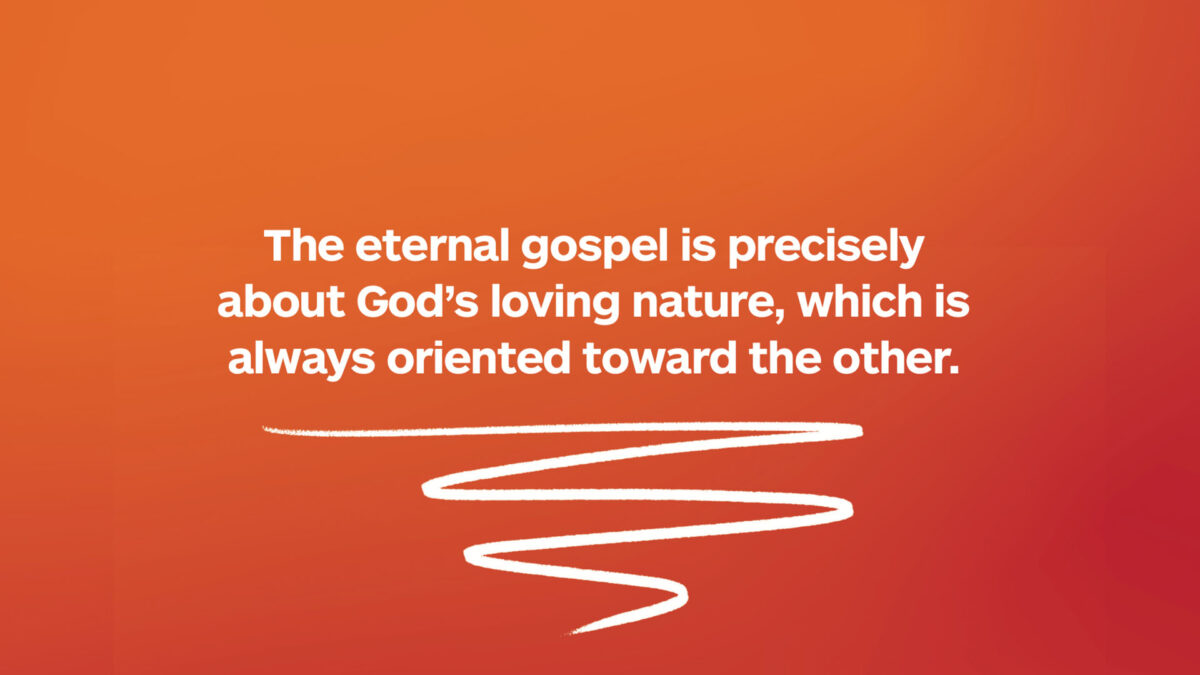The third angel’s message

Friday
The message of the third angel is a warning intended to persuade humans to avoid the fate of the wicked by taking the side of the Lamb. The strong warning leads to a description of the ultimate goal of the final judgment. Strong language and imagery continues to be used: “He will be tormented with fire and brimstone in the presence of the holy angels and in the presence of the Lamb” (Rev. 14:10).¹
THE FINAL JUDGMENT AND THE CROSS
The Greek verb basanizo (“to torture, torment”) conveys an idea that is repugnant to most people today. The verb designates an intense physical and/or mental pain over which the person has no control (cf. 2 Peter 2:7, 8). In Revelation it is used to describe the excruciating pain the woman experienced during childbirth (Rev. 12:2). In the case of the wicked, a future passive form of the verb is used—“he will be tormented.” The question is who or what is tormenting them. We will review the wording and intent of the passage to find answers.
BEFORE/IN THE PRESENCE OF THE LAMB
The wicked are tormented “in the presence of the holy angels and in the presence of the Lamb.” The picture is that of the wicked suffering intense pain while standing in the presence of angels and the Lamb. The image of Jesus accompanied by angels finds its roots in the Old Testament in passages announcing the coming of God escorted by angels to judge the wicked and save His people (Deut. 33:2; Zech. 14:9). In the New Testament it describes the visible and glorious reality of the coming of Christ. At the Second Coming Christ will come escorted by His angels (Matt. 16:27; 25:31, 32; Mark 13:26, 27). This would be the most glorious apparition of Jesus to human beings, and everyone will see Him (Rev. 1:7); they will be standing in His presence (cf. Rev. 6:16, 17). Revelation 14:10 is not about the second coming of Jesus, when only those who are alive will see Him. Here the angel borrows the language of the coming of Christ to inform us that during the last judgment Christ will appear for a last time to the wicked of all ages and to the fallen cherub.
THE LAMB AND THE CROSS
We should not overlook the fact that the language of the third angel is very precise. The wicked are standing before the Lamb, not before the King of kings, nor even before the Lord. When they look up, they see Christ as the Lamb of God who on the cross displayed God’s infinite love to all of His creatures. In Revelation the image of the Lamb that was slain is a visual expression of the gospel of salvation through faith in the sacrificial death of Jesus (Rev. 5:9). The eternal gospel is precisely about God’s loving nature, which is always oriented toward the other. Jesus stated, “I, if I am lifted up from the earth, I will draw all men to Myself” (John 12:32), some for salvation (John 3:14, 15) and others for judgment (Rev. 14:10). In God’s court of law the wicked and all evil powers are taken back to the deepest disclosure of God’s love ever revealed in cosmic history.
As they look at the Lamb, they realize that God is indeed a God of love and justice and that the cosmic conflict was unjustifiable. Ellen White writes about the moment when the throne of Christ rises above the walls of the New Jerusalem and they see Him and “above the throne is revealed the cross.”² She also writes, “Before the vision of Calvary with its mysterious Victim, sinners will stand condemned.”³ We could perhaps conclude that what torments the wicked is the display of the love of God through the Lamb. This love awakens their sense of guilt, and they see themselves as they really are while realizing that they are eternally separated from such a wonderful God. The pain will be extremely excruciating. It would be correct to say that the love of God revealed in the sacrificial death of the Lamb, which fills the heart of God’s people with joy and gratitude, will fill the heart of the wicked with intense pain and guilt. Had they accepted the gift of salvation offered to them through the Lamb, they would have escaped the judgment of condemnation. The apparition of the Lamb to the wicked will bring the cosmic conflict to a peaceful resolution.
COSMIC HARMONY
During the last judgment the most persuasive evidence that God will submit, in His court of law to the wicked and Satan and his demons, will be His self-sacrificing love revealed on the cross through the Lamb that was slain. In fact, this is the only evidence He presents, and it is sufficient. Its persuasive power cannot be fathomed, because it will hold the whole universe together throughout eternity. Looking at the sacrificial Victim, the forces of evil will recognize and confess that God is indeed righteous in His judgment against them; that they deserve to die because this is what they chose. John anticipated this moment when he wrote, “And every created thing which is in heaven and on the earth and under the earth and on the sea, and all the things in them, I heard saying: ‘To Him who sits on the throne, and to the Lamb, be blessing and honor and glory and dominion forever and ever’” (Rev. 5:13; cf. Jude 14, 15). The whole cosmos with one voice will “confess that Jesus Christ is Lord, to the glory of God the Father” (Phil. 2:11). In the final conflagration the cosmos will be cleansed from the presence of evil powers and from the result of their work. Then “I saw a new heaven and a new earth” (Rev. 21:1).
CONCLUSION
Love frames the cosmic conflict. Before sin originated, the universe pulsated in perfect harmony by the power of love, and, before the conflict is over, love brings everything back into perfect harmony. At the very heart of the three angels’ messages is this most wonderful story of cosmic dimensions that the whole world is to hear in preparation for the coming of Christ. Every effort is to be made by the church to place each one of its teachings, particularly its eschatology, and actions at the service of the eternal gospel of salvation through faith in the Lamb (cf. Rev. 14:12). This the Lord’s message to the world, and it should be incarnated in our words and actions.
Questions for Reflection:
- How can we share with others the perfect balance of love and justice in God’s character?
- Discuss the following quote from today’s reading: “Love frames the cosmic conflict.” How does it affect our daily walk with Jesus?
- How can we best share the good news of the three angels’ messages with the next generation of Adventists?
¹ Unless otherwise noted, all Scripture quotations have been taken from the New American Standard Bible, copyright © 1960, 1962, 1963, 1968, 1971, 1972, 1973, 1975, 1977, 1995 by The Lockman Foundation. Used by permission.
² Ellen G. White, The Great Controversy (Mountain View, Calif.: Pacific Press Pub. Assn., 1911), p. 666.
³ Ellen G. White, The Desire of Ages (Mountain View, Calif.: Pacific Press Pub. Assn., 1898, 1940), p. 58.








